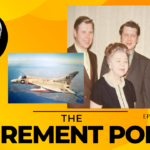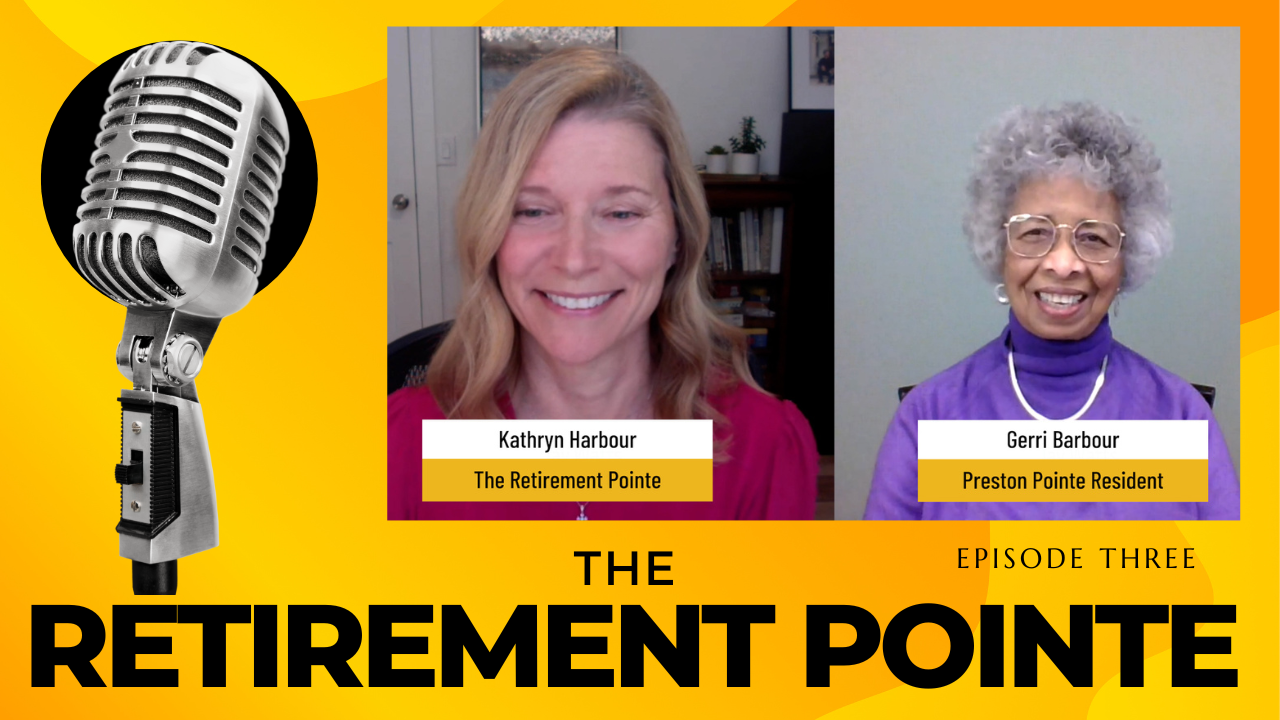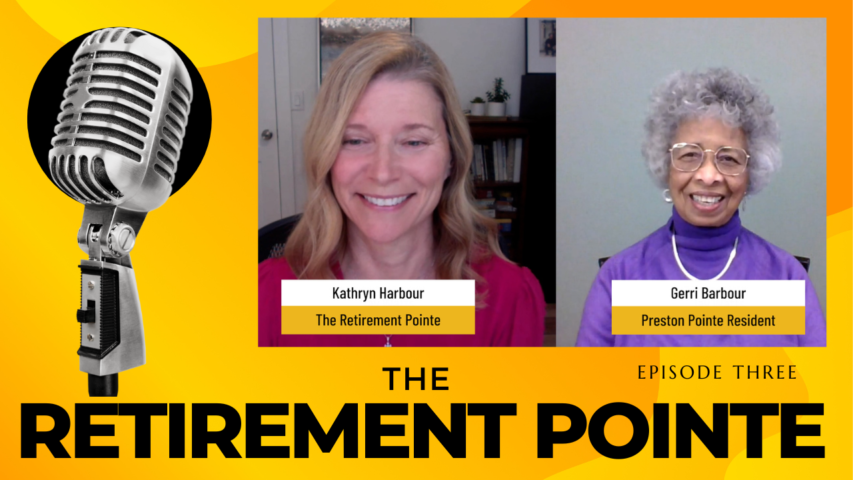The Retirement Pointe Podcast – Episode One w/Resident Larry Smith
March 31, 2024
The Retirement Pointe Podcast – Episode Two w/Dick Kase
April 2, 2024The Retirement Pointe Podcast – Episode Three w/Gerri Barbour

The Retirement Pointe Podcast is happy to introduce you to Gerri Barbour! We sat down to hear more about her life before and after she reached the Retirement Pointe. You'll hear about her life as an educator, her thoughts on how things have changed over the years for teachers, desegregation, and how to get along well with others.
Video Transcription:
Hello, and welcome to the retirement point podcast, where we celebrate seniors before and after the point of retirement. My name is Kathryn Harbor, and I'll be your host today.
This is Gerri Barbour, and I've heard just a little bit about you, Mrs. Barbour, that you were an educator and actually in the great state of Ohio. And I say that because that's where I was born and and I have a lot of family there. Let's start there. So tell us a little bit about about where you lived in Ohio and maybe a high level overview of your education career there.
I grew up in a small town in Southern Ohio. I have one sister, while it was a very pleasant place to live, although it was during segregation time. The education system was wonderful. The schools were desegregated. I thought it's a contrast that I could meet at a restaurant or stay in the hotel, but I could drink from a public drinking fountain and I could go to school, in my neighborhood school without any repercussions and, I got an excellent education.
So it sounds like that became a career path for you then being in education. Did I get that right? Or Did I mishear that?
No, that's correct. I decided to get an education in the field of education. Okay. Great.
What grades did you teach?
I started in elementary school. I taught the fourth grade, the first year, and then the fifth grade the next year.
And I didn't like teaching all of those different subjects. And I had majored in drama and minored in English in college. I was in living in, in the Bronx at the time, and New York has always had I shouldn't say always, because I don't know what it's like now, but it had specific requirements, high standards for teachers.
For example you couldn't get a teacher's permanent license if you were overweight at that time. Yes, talking about 1958 you also should not have an accent, maybe a slight one, but if it was difficult for students to understand you, then you wouldn't have a permanent license either.
The standards were high, maybe unfair, but high back then.
Interesting standards that would not work today, right? Yeah okay, so you were, you grew up in Ohio and then how did you
end up in New York? I went to Howard University and I met my husband there and he was from New York.
He he, during the, let's see, that was about 1955 and I think it was the last year of the draft around there. Anyway, my husband had taken uh, ROTC. And so he had to serve two, two years in the military. He got married and he was stationed in Alaska, so both of us were in Alaska, and came back, then we came to New York, and because, again, that was his his home had been there before, and we decided that New York was a good place to live during that time, so that's how I got to New York.
Sure.
And then did you stay in New York for the foreseeable future or did you move around since was he still in the military or not in the military any longer? He got out after his two years. Okay. Okay. Okay, and then did y'all stay and did you I'm sorry. I'm from the south. So well now So that's why I said y'all but did you stay in new york?
Yes, we did We decided that was the best place to live, because again There was a lot of segregation and new york offered many opportunities that the other states did not And so we decided to stay in new york. Plus he had relatives there, of course right lawrence And so we our daughter was born in we were in Alaska.
She was, and so I, was, it was a fairly new mother at the time when we first got back to New York. So I was home with her. And then to have a better financial pool we decided that I would go to work. And had to go back to college and get my degree in teaching or, get some courses in teaching that I hadn't before.
So I went to CCNY, City College of New York, and I got my master's and I, as I said, I taught two years in elementary school and then I decided I wanted, I didn't want to teach all those different subjects. So I, my master's in English and I went to teach in the high school ever after.
Oh, you did.
Okay. So did you mention something about drama too? So you taught English. Did you all, were you also involved in drama at the high
school? Yes, I was. I taught, they had a drama program. Excuse me. So I taught some drama courses and I also directed plays after I had been at the school for a few years because they already had someone doing that.
And so I kept it a secret that I really would like to direct. So I think after maybe two years, then I started directing and it was a wonderful experience. Most of the time I did musicals, that had been done on Broadway, and it was just a wonderful experience to see the young people blossom and Their moment on the stage and anybody who wanted to be in the play would be in the play because of course the chorus Frequently can have any number of people in it.
So I if someone didn't have a solo voice they could still be in because they would be in the group scenes and We had People of all ages participating. I did Oliver and the King and I, which needed a young child, younger child than the high school age. So we had the students when we did the King and I there were about 90 people in the cast because the King had a lot of children and a lot of wives.
So there were a lot of it was
have fun. Really, and truly, and so tell us, are there any, is there anybody that we would know that you taught that ended up being an actor or, on Broadway or in the movies or anything? Not that I know of, not that you know of, there might be, right?
Because gosh, so how many years then did you teach at the high school level?
I taught towards the end, I was in administration of a facilitator for remedial programs. So I wasn't in the classroom as much, but in education, I was a little over 50 years, maybe 52
years. Wow. Okay. Thank you so much.
I just appreciate teachers. And of course, remember fondly remember some of my favorites, for sure. It sounds like It probably made an impact on a lot of students. So do you, did you hear from them at all after you retired or, do you still sometimes to this day?
Yes. I, at Christmas time, I exchange cards, with some of the students and the faculty members have kept in touch with each other too.
So I have some special friends that I made when I was teaching in New York. How nice. That's wonderful.
So you mentioned New York was different from some of the other states as it relates to desegregation. Can you just maybe shed some light on that for us? For I, I do remember briefly. So in the late seventies, I lived in Columbus. My, I was probably, 11 or 12. And I remember the talk about busing and And that's all I really remember.
And of course that was, like I said, that was in the seventies. So it sounds like New York was way ahead of everybody. If they were desegregated in the, you said in the fifties. So yes, could you just pop a little bit more about that for us? Of
course, each school district was different and there were places in New York where people were uncomfortable, but in the Bronx and in Westchester County, where I taught, People just got along, the students got along as I said the schools were desegregated, and the teacher, when the teacher taught everybody who was in front of her or him got the same information there was no feeling that black students were getting a, an inferior education, because they were right in the classroom with everybody, Everybody in that got the information.
We had diversity programs in service classes in the area of diversity. I it's almost surreal with the closeness. of the faculty. When I did the plays the physical ed teacher did the choreography. The shop teacher built the sets. And of course the music teacher taught the songs and directed the orchestra.
Everybody would, and the PTA sold the tickets to the plays. So we, everybody worked together. And and we achieved and so from time to time, there might be individual obstacles, but for the, like one time I had a student who plagiarized on his term paper and his mother had to come in and talk with me and in the course of the conversation, she just tossed out that she was a friend of the superintendent.
Smile to myself. I don't know whether you are not if he cheated. He cheated. We're not going to tell you just so
are you asking me to do here?
What do you make of all of, I would think that now with AI and, all that we have going on, how easy it would be for students to. Have these new programs actually write a paper for that, just yeah. Is, what do you make of all of that?
Uh, I'm glad I'm not teaching now, I not a technological person and using, the computers and everything and AI makes it even worse because I don't know the challenge to developmentally isn't there, isn't the same based and, I I'm glad I taught when I did.
I bet. I bet. For sure. From the time you started teaching high school to the time that you stopped teaching high school or retired, what did you, were there big differences from the beginning to the end in terms of? Just students level of interest, their their brain power, their motivation.
Did you notice a big change in that 50 or so years? Definitely. I did. See, um, even before computers were in the schools there were changes. And I taught in elementary school in the Bronx, as I said, and I think it was pretty widespread in New York schools that there was an auditorium day and the students would wear like a white blouse, a white shirt and navy blue skirt, and they would have the an assembly and put them on programs and so on.
And then for some reason they stopped and dress codes were no longer in existence. And so teachers and students. Or what they wanted to. And I personally felt that started a decline in the quality of participation and an achievement with jeans, sneakers on, you have to then ask people to take their feet off the desk it.
And I couldn't teach now because as I said, I'm not technologically inclined with AI and the computer, I don't know the computer that well, and they do so much work, the machinery. And I'm just, I don't know. I wonder how much the human brain is being used and how much machines are in control.
Think it's interesting that you mentioned that you think that the start or the decline, I don't know if that's the right word, but the start of it was with the change in the uniform requirements. It's almost are you suggesting that the school, that school itself was taken less seriously because of the uniform requirements?
Of relaxing the dress code and it started with relaxing the best code. Yes. Yeah, I actually liked uniforms. I went to a Catholic school for a period of time and it was nice not to have to worry about what to wear every single day. It was just laid out for me. But that is really, that's interesting.
I, I imagine there of parents that would probably appreciate a dress code because it would be easier all around.
Yes, and then you couldn't tell the teachers from the students, from high school students because the teachers had on jeans and, shirts out and I was old fashioned.
I just thought, you should, teachers should dress like adults and on on a job and not going to the beach or somewhere, uh,
Mrs. Barbour, it's such an honor to have you on. It really is. I love hearing about, I love hearing your story and history. And, is I would I would love to know, sitting where you are now, what would, if you could go back and talk to your 30 year old self, what would you say to her today?
I would say that there are, that life is good. I have as my mantra, reach out and touch somebody's hand, make this world a better place. If you can. And I think if on a personal basis we get to know each other, that things can get better in the world and with things that are going on today, if you were to ask me, will you asked me back in the thirties, now I'm 90 and, I never thought about what it would be like to live a hundred years, and it's I've had a good life. I've met some wonderful people. I've been blessed and I look forward to. Continuing and see if I can't make it to that century mark.
It sure seems like that's a great possibility because, oh my gosh I would never have guessed you were 90, not in a million years.
So what brought you to Preston Point? A lot of curiosity.
He passed. Yes, he passed in 2022. And children live in the Raleigh area Chapel Hill. And it was a, almost a two hour drive from here to Kinston because traffic, there's so many highways and traffic is so bad. Swift.
We decided that the best thing was for me to come closer to them. They checked around. We got information about Preston Point and visited and seemed like a place that I would be happy. And I am. I
I love to hear that. And how nice that you're, you get to be close to both of your children.
That's wonderful. Yes.
And my grandchildren are here. Okay, when he's in North Carolina now,
they're your grandchildren are all in their 20s.
Yes. Yes And I have one great grandson
Oh, how lovely that's great. Yeah. Wonderful. What have you I would imagine you've met a ton of people at Preston point is it a what are some of the things that you enjoy doing there?
The exercise classes. I some, I haven't been able to go every, every week. But I'm, and it's amazing how long it takes to put things in order, getting your papers together and deciding what pictures to keep and so on. And I'm still have things in papers in boxes that I have to make to sit but at Preston Point one's time is one's own, I can do whatever I want to do when I can eat what I want to eat if I, I usually go with people that I met early on and we, we go, I don't always go to breakfast because I don't like to get up early, so we have that in a lot of cases.
And I really never like to cook and so I don't have to cook, and that's one of the highlights of staying there in here. The people are friendly. We, in our conversations we, we find we have things in common and people are from many different places. There are some New Yorkers here, people from Ohio.
The surroundings are so lovely, going outside with the beautiful landscaping of the celebrating special occasions, St. Patrick's Day and Black History Month. It's, um, it's, I was going to say it's a well designed program, see, I go back to teaching. It's everything.
To make me comfortable is here except for, of course, the people that are gone. But I'm glad my my children found this place because, oh,
good. Yeah. It sounds lovely. Yeah. Yeah. And you sound like you're happy there. So that's great. Yep. Yep.
Is there anything else that you would like to share with us? Anything else that that you would Gosh, that we can pass on and share with another generation. Any last bits of wisdom from Mrs. Gerri Barbour?
No, just that
it's good for us to be open minded and realize that. We have a lot to share and yes, we are our brother's keeper and I don't want to get political, but a lot of things are going on today that show that people aren't close together, that they don't have much love for each other.
And that's unfortunate, but. Each of us, we do what we can, in our circles, and I think we can make a difference over time. If I may add, going back to segregation, in New York State, I don't know who came up with the idea, but we had a series of Parties and people came and they talked and found out what they had in common.
And if you really enjoyed someone's company, then you arranged to go have dinner with them somewhere, go to their home, come to your home. And there were two couples that my, my first husband and I we came. to, and we used to visit each other and the friendship lasted, through the death of the people and it just showed what can be done.
We we can. Go to the air in places, the beach, places together. Yeah. Alana's based on fear and lack of contact, and being misguided. That's right. I just wanted to add something about a special student that I like to. Oh, yes. We were going to do Fiddler on the Roof. And one young man had a beautiful voice.
And he was a special ed student. And his mother said she didn't think he could learn the lines. And Tevye is on the stage almost all the time. And so she said she didn't think he could learn the lines. And he said, He could, and when he said he could, I said to myself, he can't. And so I put him in the role, he learned every line.
Oh. Sang his little heart out. And you ask if any of my students, became, Quote unquote name people. He decided that he was going to try to make a living as a singer, as a musician. And I don't know how far he was able to carry it, but it was, it just did my heart good to see him out there on that stage.
Yeah, it's important and I think that's a problem with the world today is that we don't encourage each other enough, uh, make a person feel good about himself. Need to remind each other that things can be. All right, don't give up, don't get angry, but work with other people and make this world a better place.
Cheers.
Yeah.
That's something I really appreciate and notice in people when they're encouragers. That's such a gift when people are really wonderful encouragers. So that's, I love that. So it sounds like yes,
people encouraged me. People encouraged me. My, I remember my sixth grade teacher, we had a little not address books keepsake books, that you had.
And my sixth grade teacher wrote, you have great possibilities, so don't waste them. And to me that meant, she wanted me to be all I could be. And so I'm going to try everywhere. She believed in you.
Yeah, yes
she did
And it sounds like you believed in a lot of your students. So I'm sure you made an impact.
Yeah. It's been a pleasure hearing from you and meeting you. And thank you to all of our listeners today who are, who joined us at the retirement point podcast. All right. You have a good rest of your day, Mrs. Barbour. Thank you for joining us today at the Retirement Pointe podcast. Be sure to like, and subscribe so you can hear more about what it's like before and after the point of retirement.

